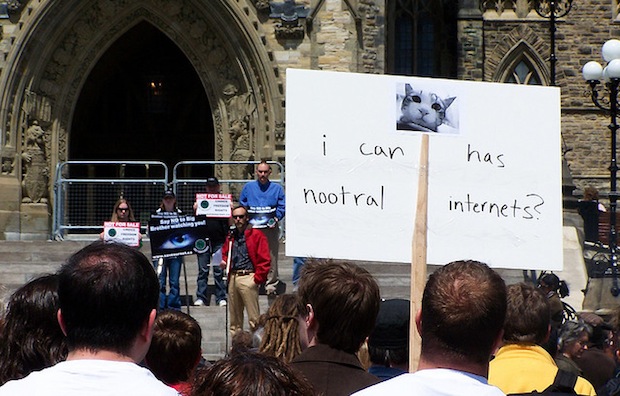
Facebook is bad for the web, argues one man who should really know: Tim Berners-Lee, who invented the web. Meanwhile Verizon's arguing that the FCC and the law are bad for the future of cell phones and our increasingly mobile access to the web. Is our booming web world its own undoing?
Berners-Lee, who created the idea behind the World Wide Web and built the first browser, editor and web page at CERN in the 1990s, has just published an essay in Scientific American that contains stark warnings about how the web may evolve in the future. Berners-Lee noted his support of Net Neutrality principles long ago, but in this case he has very specific points about the biggest names in web tech at the moment. Facebook, he worries, may be terribly bad for the web, and thus potentially affect how our future tech-centric lives will play out.
Tim's niggle is that Facebook's doors are firmly shut. It may be making notional plays in favor of openness, like the recent "download your data" system, but really it ignores the idea of open sharing, and is developing inside a closed-off, walled-off Internet Ecosystem all of its very own--a kind of Madagascar in terms of evolutionary advances. The web has become a "powerful, ubiquitous tool" he notes precisely because it was "built on egalitarian principles," a foundation that some of "its most successful inhabitants" have begun to erode. "The more you enter [into Facebook], the more you become locked in. Your social networking site becomes a central platform--a closed silo of content, and one that does not give you full control over your information in it."
Given Facebook's recent censorship-esque moves to quash criticism, CEO Mark Zuckerberg's carefree and socially immature notions about personal privacy and Facebook's dominance over the Net--over 600 million users (around one in 10 humans alive) and 25% of clicks in the U.S. last month--Berners-Lee may have a point. Facebook's machinations become a de facto standard for how to behave on line. Of course other social sites are equally closed-minded, but Facebook has the biggest sway. Even Apple's closed platform-specific iTunes App Store worries Tim for very similar reasons---he argues that while it's innovative, it sets a standard for a walled-off ecosystem that is too tightly controlled, and doesn't permit cross-platform innovations.
Meanwhile, Verizon has just leveraged its position as the biggest cell phone network in the U.S. to lobby Congress to radically shake up the telecom laws. Now that a "highly innovative and competitive Internet eco-system" is a "critical resource for consumers and increasingly important to America's economic growth," Verizon shouts, "Congress must act to address telecommunications policies that are broken."
Stern words. Verizon's beef is that the entire legal and administrative edifice of the FCC and layers of federal and state law about telecomms is outdated. By about a century: "The grinding you hear are the gears churning as policymakers try to fit fast-changing technologies and competitive markets into regulatory boxes built for analog technologies and monopoly markets," says Verizon's EVP of public affairs Tom Tauke. The FCC looks at the world from the viewpoint of its jurisdiction, rather than how it affects consumers' lives, and there's far too much "anticipatory rule-making" and arguments about traffic profiling and its impact on Net Neutrality ignores "other sectors of the Internet marketplace where similar consumer harm could take place."
So, on one hand we have the inventor of the WWW saying its biggest inhabitants are setting a bad example, and damaging the web's amazing potential to further change our lives, and on the other there's Verizon--with tens of millions of cell phone clients in its network--worried that the entire legal framework of the Net is flawed. This is big stuff, but will any of it make any difference? With a U.S. president who seems to be slipping on his promise of a science and innovation-friendly administration, and the recent power swing in U.S. politics it's impossible to tell. It would take several senior figures to stand up and risk their political careers to change things this big, and lots of dollars to convince Facebook that its policies are harmful.

You need to be a member of DealerELITE.net to add comments!
Join DealerELITE.net